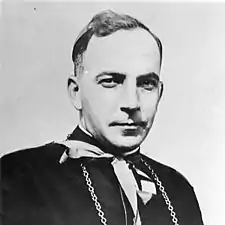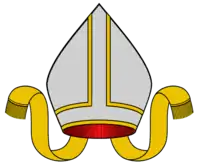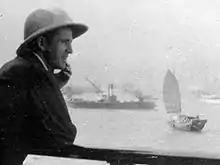Francis Xavier Ford
Francis Xavier Ford, was an American bishop of the Catholic Church and a Maryknoll missionary in China. Because of his torture by the Communist Chinese and death in prison in 1952, he is considered a martyr, and the cause for his canonization has begun, granting him the religious title of Servant of God.
Francis Xavier Ford | |
|---|---|
| Bishop Emeritus of Kaying (Meizhou) | |
 Bishop Ford in 1951 | |
| Installed | April 11, 1946 |
| Term ended | February 21, 1952 |
| Other posts | Vicar Apostolic of Kaying (1935–1946) |
| Orders | |
| Ordination | December 5, 1917 |
| Consecration | September 21, 1935 by Bishop James Anthony Walsh, M.M. |
| Personal details | |
| Born | January 11, 1892 Brooklyn, New York, United States |
| Died | February 21, 1952 (aged 60) A prison in Guangzhou, China |
| Buried | location unknown |
| Nationality | American |
| Alma mater | Maryknoll Seminary |
| Sainthood | |
| Venerated in | Roman Catholic Church |
| Title as Saint | Servant of God |
| Styles of Francis X. Ford | |
|---|---|
 | |
| Reference style | The Right Reverend |
| Spoken style | Your Excellency |
| Religious style | His Excellency |
| Posthumous style | Servant of God |
Life
Early life and priesthood
Ford was born in Brooklyn, New York, the son of Austin Brendan Ford and Elizabeth Rellihan Ford. He attended Cathedral College in Manhattan. While studying there, he felt a call to respond to the vision of the Catholic Foreign Mission Society of America, just founded in 1911 by the Catholic bishops of the United States for overseas service. Upon completion of his high school studies, he was accepted by the Society.
When Ford reported to the Maryknoll seminary in Ossining, New York, on 14 September 1912, he became the first student of the fledgling Maryknoll Society.[1] He was the first person to matriculate in this institution.[2] He was ordained on December 5, 1917, and became one of the first four American Catholic priests to arrive in China in 1918.[3]
Ford's cousin, Maryknoll sister Ita Ford, was one of four Catholic churchwomen who were tortured, raped and murdered in El Salvador by members of a military death squad on December 2, 1980. She had previously worked with the poor and war refugees as a Maryknoll Sister missionary in Bolivia and Chile.
Missionary service

In 1918 Ford began to serve in the Province of Canton (Guangdong), in southern China, and in 1921 opened the first Maryknoll mission in China. He was named Prefect Apostolic of a new mission in Kaying (Meizhou) in northern Guangdong in 1925. The Prefecture was raised to the status of a Vicariate Apostolic in 1935, with Ford named as Vicar Apostolic, for which he was appointed the titular bishop of Etenna.[4] He was consecrated a bishop by James Anthony Walsh, the Superior General of the Maryknoll Society, on September 21, 1935.[5]
During twenty years of serving in Kaying, Ford increased his flock from 9,000 to 20,000, and built schools, hostels and churches. He was chairman of the Chinese Catholic Welfare Conference for Southern China and played an important role in establishing the first overseas convent for the Maryknoll Sisters. When World War II started, Kaying was surrounded by Japanese troops.[6] Nevertheless, Ford remained at his post, aiding Chinese guerrillas, helping downed Allied airmen escape,[7] relieving war refugees in distress.[2] Shortly after the war ended, in April 1946, the vicariate was raised by the Holy See to the status of a full diocese, with Ford appointed as its first bishop.
Torture and death
The victory of the forces of the Chinese Communist Party over the Nationalist forces of General Chiang Kai-shek in October 1949 marked a major shift in the fate of the Catholic missions. In December 1950 the Communists placed Ford and his secretary, Joan Marie Ryan, under house arrest and charged them with espionage. Though never tried, Ford was taken from his home four months later and publicly paraded, beaten and degraded in some of the cities in which he had done mission work since 1918. His treatment at the hands of the Communists is attested to by Ryan.[2]
In one town, a Communist-orchestrated mob beating was so intense that even Ford's Communist guards fled. Though knocked to the ground repeatedly, Ford continued to walk calmly through the crowd until his guards returned. In another town, his neck was bound with a wet rope which almost choked him as it dried and shrank. Another rope was made to trail from under his gown like a tail. To humiliate them both, the Communists forced Ford to undress before Ryan. The last time she saw Ford alive was in February 1952, just before he died. She reported that his hair had turned completely white and he was so emaciated that a fellow prisoner remarked that he looked "like a sack of potatoes".[2]
Ford died in a prison in Guangzhou on February 21, 1952.[2][6] He was the first American Roman Catholic bishop and fourth American civilian known to have died in the prisons of the Chinese Communists.[2]
Ford's diocese would have been the first Maryknoll territory to be turned over to the native clergy had the Communists not suppressed the local Catholic community. Ford was Maryknoll's first martyr, and the first to be killed at the hands of Chinese Communists.[2] Ford's remains were never found, having been intentionally scattered by the Chinese Communists. At the time of his death, Ford had been a priest for 34 years and a bishop for 16 years.
Legacy
Cause for canonization
A cause for the canonization of Ford has been introduced by the Roman Catholic Diocese of Brooklyn. John Vesey, pastor of St Michael's Catholic Church in Flushing, Queens, is the postulator of the cause.
On July 27, 2011, George Weigel wrote an article for the First Things blog, questioning why Ford has not yet been beatified. Wiegel opined that the process has been put on hold because of Roman authorities' concerns about offending the Chinese government.[8] Weigel further stated that "[persecuted] Catholics [in China] need the encouragement of a witness like that given by Francis Xavier Ford, whose blood may yet prove to have paved the King's Highway in the Middle Kingdom".[8]
Memorials
- In 1952, the Maryknoll Fathers in Hong Kong founded a co-educational primary school, and named it Bishop Ford Memorial School (Chinese: 福德學校). The school was the first founded by the Maryknoll Fathers in Hong Kong after the Second World War, and is now managed by the Roman Catholic Diocese of Hong Kong.[9]
- In 1962, the Roman Catholic Diocese of Brooklyn named one of its high schools after Ford. Bishop Ford Central Catholic High School was accredited by the Regents of the State of New York and the Middle States Association of Colleges and Schools. It was located in the Park Slope area of Brooklyn. Due to a 75% decline in enrollment between 2006 and 2014, the school closed at the end of the 2013-2014 academic year.[10][11]
Bibliography
The following are books by Bishop Ford, posthumously published:
Biographies
- Betz, Eva K. (1953). To Far Places: The Story of Francis X. Ford. New York: Hawthorn Books. OCLC 2940634.
- Donovan, John F. (1967). The Pagoda and the Cross: The Life of Bishop Ford of Maryknoll. New York: Scribner. OCLC 1376571.
References
- Donovan, John F. (1967). The Pagoda and the Cross – The life of Bishop Ford of Maryknoll. New York: Charles Scribner’s Sons.
- "Religion: On the King's Highway". Time. September 15, 1952. Retrieved May 2, 2010.
- Wiest, Jean-Paul (1988). Maryknoll in China: A History, 1918–1955. Armonk, New York: M.E. Sharpe. ISBN 0-87332-418-8.
- Cheney, David M (March 7, 2011). "Bishop Francis Xavier Ford, M.M. †". Catholic-Hierarchy. Retrieved July 27, 2011.
- Shavit, David (1990). "Ford, Francis Xavier". The United States in Asia: A Historical Dictionary. Greenwood Publishing. p. 170. ISBN 9780313267888.
- Lieberman, Henry R. (September 4, 1952). "U.S. Bishop Died in Red China Jail Last Feb. 21". New York Times.
- "Bishop Ford with nuns and airmen during WWII". 308th Bomb Group's Stories from the collections of our Veterans. Archived from the original on 28 June 2011.
- Weigel, George (July 27, 2011). "Why Hasn't Francis Ford Been Beatified?". On the Square. First Things. Retrieved July 27, 2011.
- "Bishop Ford Memorial School". Retrieved April 29, 2011.
- "Brooklyn's Bishop Ford H.S. Closing in June". WNBC. April 14, 2014. Retrieved February 27, 2015.
- "Bishop Ford Central Catholic High School Home Page". Bishop Ford Central Catholic High School. Archived from the original on March 8, 2015. Retrieved February 27, 2015.
After 52 years of tending to the spiritual, educational, physical and social development of the youth of Brooklyn, Bishop Ford Central Catholic High School has ceased operation as a school as of August 31, 2014.
| Wikimedia Commons has media related to Francis Xavier Ford. |
